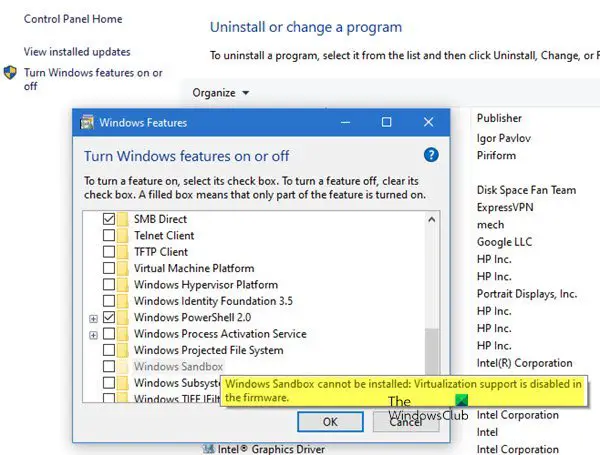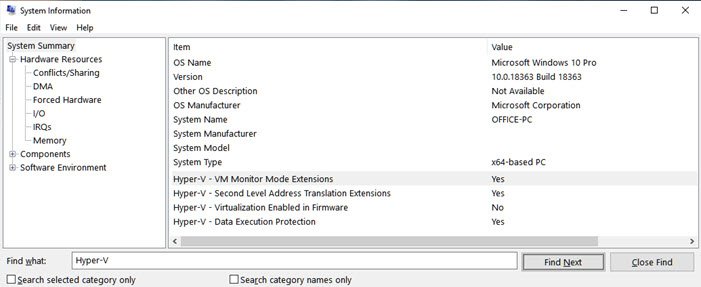This post will guide you if you receive error message Windows Sandbox cannot be installed, Virtualization support is disabled in the firmware in Windows 11/10 Professional or Enterprise versions. When you go on to enable Windows Sandbox via the Control Panel, you may find that the Windows Sandbox entry is grayed out, and you see this error message. Here’s what you can do to resolve the problem.

Windows Sandbox cannot be installed, Virtualization support is disabled in the firmware
Windows Sandbox is a safe environment (Windows inside Windows) where you can safely run and test applications without letting them access the physical machine. The applications lifetime as long as the Sandbox keeps running. That said, to run Sandbox, you need Virtualization support, but if ts not enabled on the firmware level (hardware virtualization), it will not work.
The error message is obvious, and the only way to install Windows Sandbox is to enable Virtualization at the firmware level. If you have a doubt, read our guide to figure out if your computer supports it.

You can also quickly figure it out by typing “msinfo32” in the Run prompt (Win +R), followed by press the enter key. It will reveal the system information, and the end details about Virtualization will be available. If all information about Hyper-V is yes, and the only Virtualization Enabled in Firmware is No, then you only need to enable on the hardware level.
Read: How to enable or disable Hardware virtualization via BIOS.
Turn on Intel VT-x AMD-V aka Hardware Virtualization in BIOS or UEFI Firmware
Depending on your Laptop or Desktop model, find a way to boot into the BIOS. They are usually the F2 or Del keys. If you cannot find it, the other way to get into the firmware would be through Recovery.
Go to Settings > Update and Recovery > Recovery > Restart Now. In the Recovery, select Troubleshoot > Advanced Tools > UEFI Firmware Settings.
The BIOS will have the hardware virtualization listed as Virtualization or something similar.
You will have to look for the term that can help you figure out which menu to enable. Once inside the BIOS, follow the steps.
Open the Advanced CPU configuration or Chipset Section. Locate the virtualization settings, and look for a setting that can enable Virtualization. It can be under the Processor menu, Chiupsert, or even Advanced Chipset.
Once you find the setting, use the keyboard to enable the settings. Make sure to save and exit.
Reboot the computer and then go back to installing Virtual Sandbox, but this time, it will not be greyed out. Instead, you can check the box and install it.
Read: How to enable TPM in Hyper-V to install Windows 11.